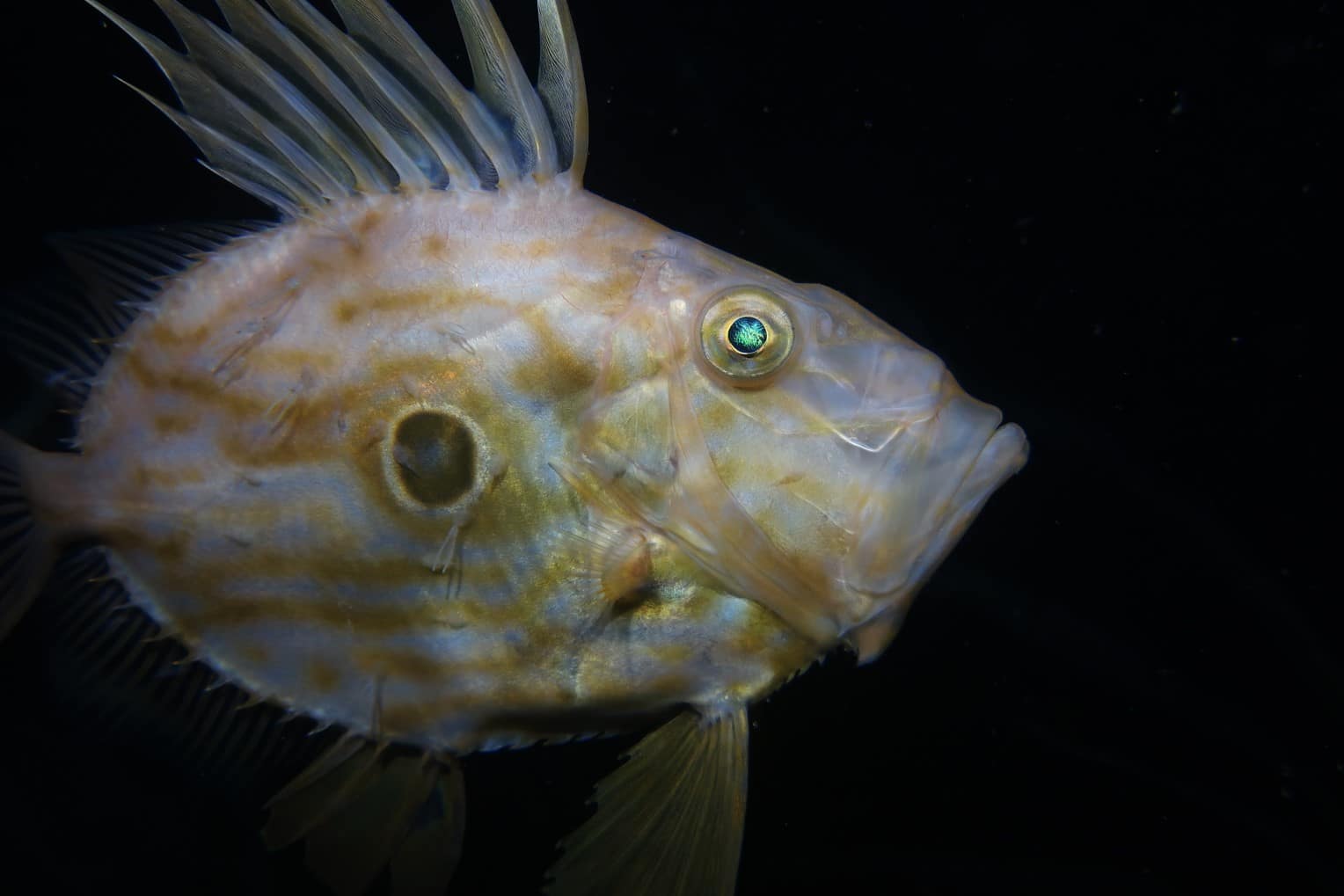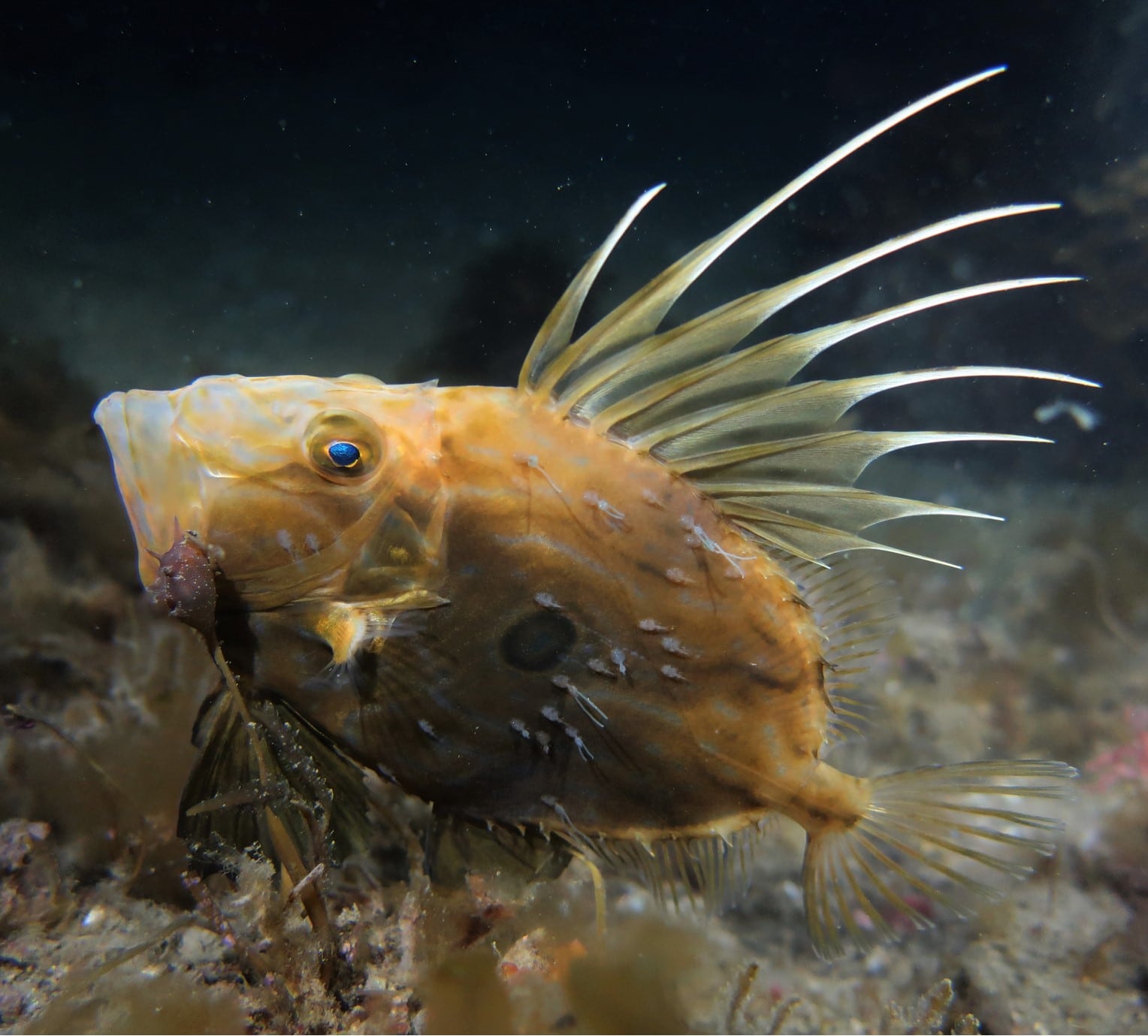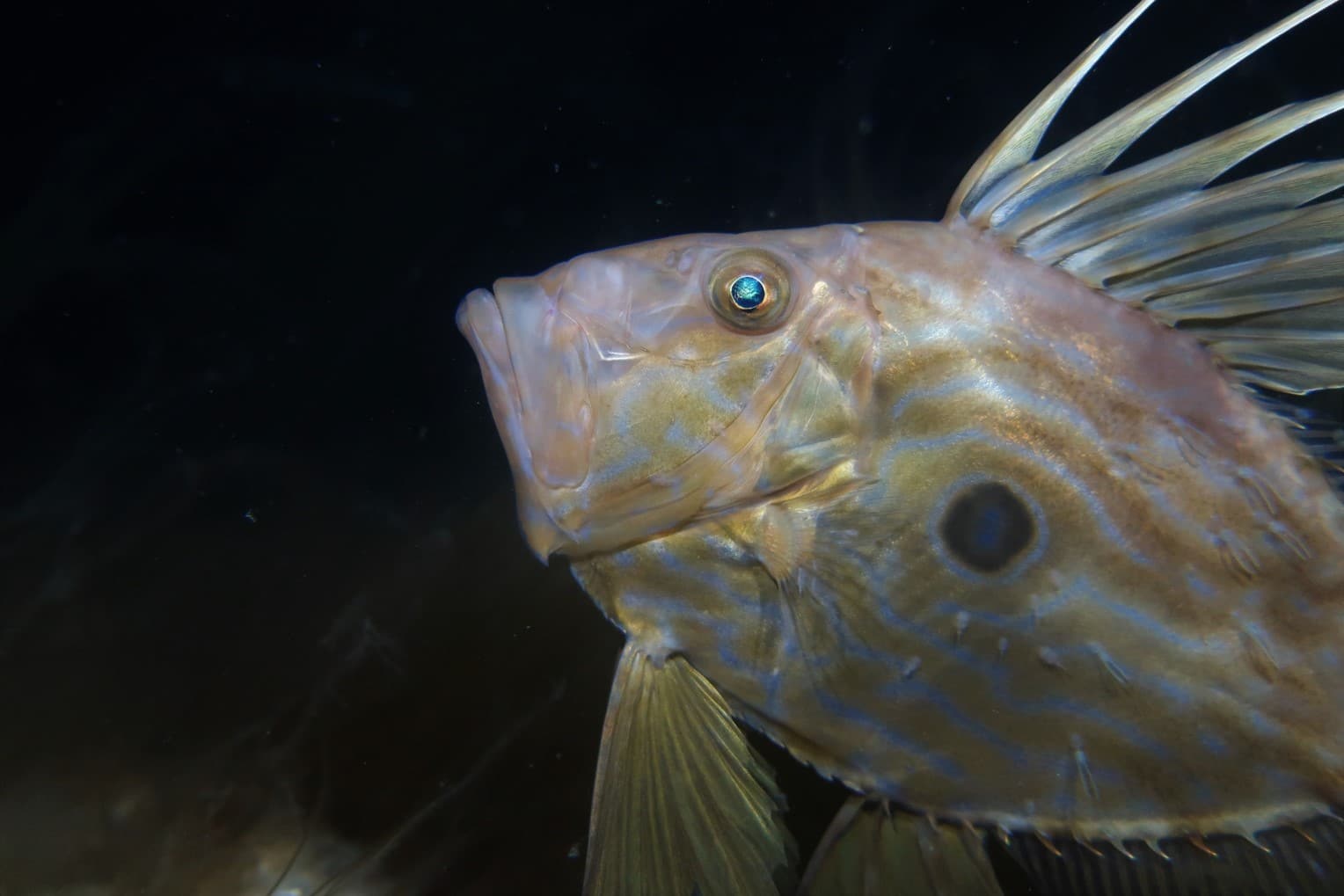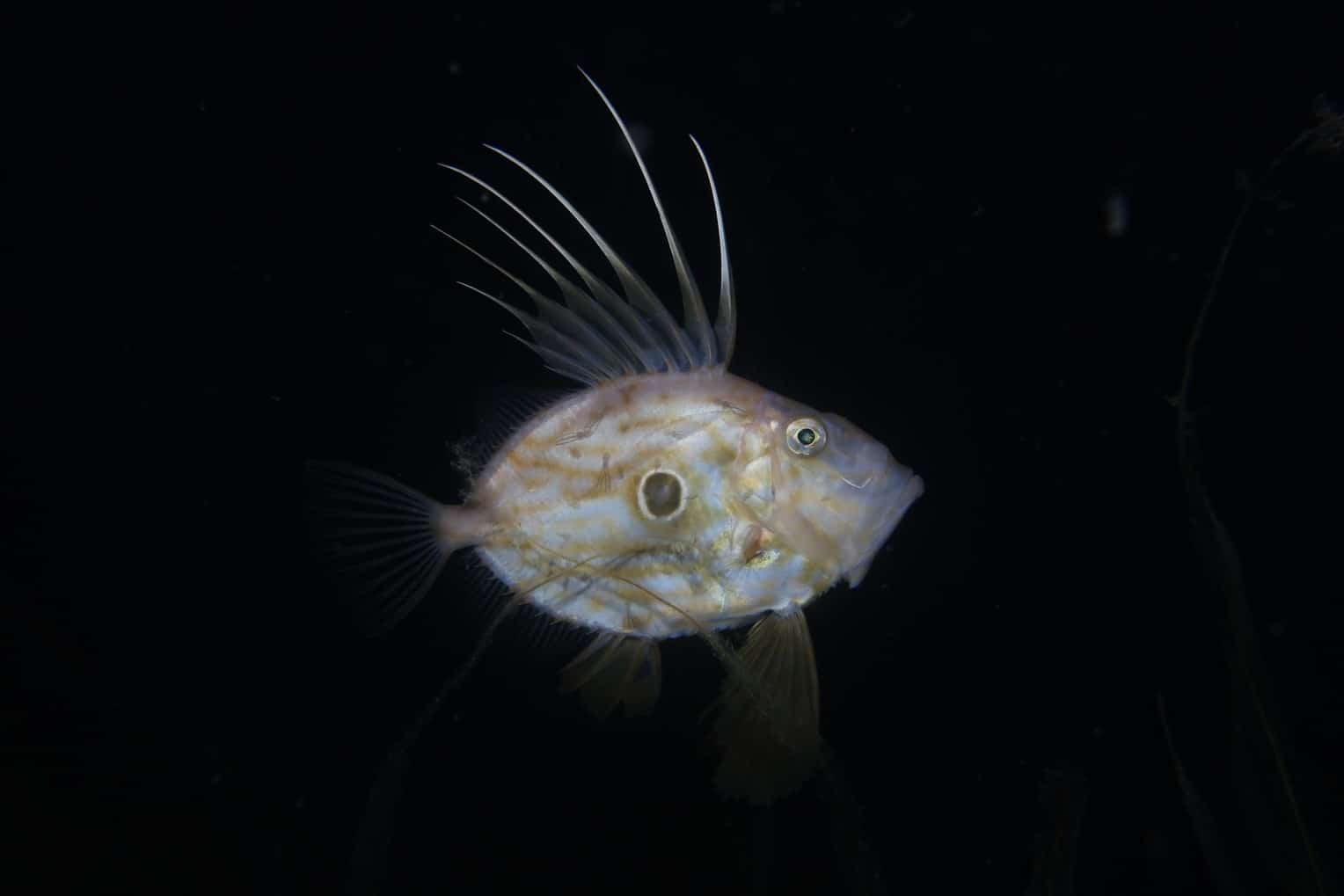Marine Life & Conservation
Diving with British Marine Life: The John Dory

Part 1 of a new series by our latest blogger Georgie Bull…
A few years ago, I attended a work experience placement at the London Aquarium. During a school session, the staff members gave the children a group of 20 photo cards and asked them to choose which ones they thought showed native species. The cards pictured the likes of corkwing wrasse, orca, basking sharks, cod, whiting, mackerel, and vibrant nudibranchs. Of these, colourful species were seldom selected. At the end of the activity, it was revealed that all the cards showed permanent or seasonal UK residents, which was met with shock from both the pupils and staff.
From this experience, and many more like it, I’ve come to realise just how underappreciated British marine life is.
Over the next six blogs, I will explore just a handful of the charismatic species encountered in the South West of England. I aim to introduce each species, describing my encounters with them before highlighting any relevant literature. There is still so much we don’t know about the species living on our doorstep.
In the build up to my first night dive at Chesil Cove last year, sighting reports circulated that john dory (Zeus faber) were seemingly everywhere. This species had been on my ‘to see’ list for quite some time so any likelihood of seeing one filled me with excitement. Halfway through the dive I noticed a faint, but frantic undulation centred around what looked like a large grumpy dinner plate. It was indeed a john dory. This individual was so full of expression that I found it hard not to fixate myself for the duration of the dive! This was the start of what became a frequent occurrence throughout the season.
Profile
As well as their false eyespot, elongate fins, and disc like body, john dory demonstrate distinctive behaviour in the water. Their movement is relatively slow, though their soft anal and dorsal fins (positioned behind their spined counterparts) move frantically to alter their position in the water. While small, their mouth is capable of rapid extension to draw in prey, and they’ll manoeuvre their bodies into all sorts of strange positions in the water to do so.
Zeus faber are often associated with warm water, but their distribution conflicts this idea, with their Northern range extending as far as Norway!
John dory are categorised as data deficient by the IUCN. The IUCN ranks species based on their population trends, and they are particularly famous for their ‘Red List’ which categorises endangered species. Sometimes insufficient information is available, and the organism is regarded as data deficient. As this is the case for the john dory, questions arise about how their population is coping with its value to the fishing industry.
Literature
It’s true that anglers and divers value john dory, but scientists have been finding out more about the species in recent years. One of their most distinctive features is the false eyespot. These spots are found in a variety of organisms from butterflies to lizards and are thought to divert predator attacks to less essential parts of the body (e.g. the tail) which may offer increased chance of escape. The role of eyespots in nature is understudied, but lab experiments in 2011 and 2013 showed that predators were inclined to attack eyespots spots more so than other areas of the body. This provided evidence in favour of eyespots acting as attack diversions.
On a different note, sound in the marine environment is receiving increased attention recently. Iconic footage captured by the BBC for Blue Planet 2 of reef noise, or hot topics like noise pollution from boat traffic are taking centre stage. But sound in the marine environment is used by individuals to communicate in a variety of different ways. John dory create sounds with sonic muscles that surround their swim bladder. Until 2018, this sound had only been recorded in air. A study recorded the species using baited remote underwater video (BRUV) footage and found that individuals would make the sound when predators were near. This caused predators to flee, suggesting the sound could serve as a territorial defence mechanism. As with all species, there are still many aspects to the life of john dory that we are only just beginning to understand.
References:
- https://www.iucnredlist.org/species/198769/42390771
- https://www.marlin.ac.uk/species/detail/1542
- https://royalsocietypublishing.org/doi/full/10.1098/rspb.2013.1458
- https://link.springer.com/article/10.1007/s00265-011-1173-7
- https://journals.plos.org/plosone/article?id=10.1371/journal.pone.0204647
Hear more from Georgie here: https://georgiebullphotography.home.blog/
Marine Life & Conservation
Double Bubble for Basking Sharks

 The Shark Trust is excited to announce that, for two more days only, all donations, large or small, will be doubled in the Big Give Green Match Fund!
The Shark Trust is excited to announce that, for two more days only, all donations, large or small, will be doubled in the Big Give Green Match Fund!
Donate to Basking in Nature: Sighting Giants
The Shark Trust is hoping to raise £10k which will be doubled to £20k. This will go towards Basking in Nature: Sighting Giants. And they need YOUR help to reach they’re goal.
The Shark Trust’s citizen science project is to monitor and assess basking sharks through sightings; encouraging data collection, community engagement, and promoting nature accessibility. This initiative aims to enhance health and wellbeing by fostering a deeper connection with British Sharks.
Campaign Aims
- Increase citizen science reporting of Basking Sharks and other shark sightings to help inform shark and ray conservation.
- Provide educational talks about the diverse range of sharks and rays in British waters and accessible identification guides!
- Create engaging and fun information panels on how to ID the amazing sharks and rays we have on our doorstep! These can be used on coastal paths around the Southwest. With activities and information on how you can make a difference for sharks and rays!
- Promote mental wellbeing through increasing time in nature and discovering the wonders beneath the waves!
Donate, and double your impact. Click Here
Marine Life & Conservation
Leading UK-based shark conservation charity, the Shark Trust, is delighted to announce tour operator Diverse Travel as a Corporate Patron

 Corporate Patrons provide a valuable boost to the work of The Shark Trust. The Trust team works globally to safeguard the future of sharks, and their close cousins, the skates and rays, engaging with a global network of scientists, policymakers, conservation professionals, businesses and supporters to further shark conservation.
Corporate Patrons provide a valuable boost to the work of The Shark Trust. The Trust team works globally to safeguard the future of sharks, and their close cousins, the skates and rays, engaging with a global network of scientists, policymakers, conservation professionals, businesses and supporters to further shark conservation.
Specialist tour operator Diverse Travel has operated since 2014 and is committed to offering its guests high quality, sustainable scuba diving holidays worldwide. Working together with the Shark Trust will enable both organisations to widen engagement and encourage divers and snorkellers to actively get involved in shark conservation.
“Sharks are truly at the heart of every diver and at Diverse Travel, we absolutely share that passion. There is nothing like seeing a shark in the wild – it’s a moment that stays with you forever!” says Holly Bredin, Sales & Marketing Manager, Diverse Travel.
“We’re delighted to celebrate our 10th year of business by becoming a Corporate Patron of the Shark Trust. This is an exciting partnership for Diverse and our guests. We will be donating on behalf of every person who books a holiday with us to contribute towards their vital shark conservation initiatives around the world. We will also be working together with the Trust to inspire divers, snorkellers and other travellers to take an active role – at home and abroad – in citizen science projects and other activities.”
Paul Cox, CEO of The Shark Trust, said:
“It’s an exciting partnership and we’re thrilled to be working with Diverse Travel to enable more divers and travellers to get involved with sharks and shark conservation. Sharks face considerable conservation challenges but, through collaboration and collective action, we can secure a brighter future for sharks and their ocean home. This new partnership takes us one more valuable step towards that goal.”
For more information about the Shark Trust visit their website here.
For more about Diverse Travel click here.
-

 News3 months ago
News3 months agoHone your underwater photography skills with Alphamarine Photography at Red Sea Diving Safari in March
-

 News3 months ago
News3 months agoCapturing Critters in Lembeh Underwater Photography Workshop 2024: Event Roundup
-

 Marine Life & Conservation Blogs2 months ago
Marine Life & Conservation Blogs2 months agoCreature Feature: Swell Sharks
-

 Blogs2 months ago
Blogs2 months agoMurex Resorts: Passport to Paradise!
-

 Blogs2 months ago
Blogs2 months agoDiver Discovering Whale Skeletons Beneath Ice Judged World’s Best Underwater Photograph
-

 Gear Reviews3 months ago
Gear Reviews3 months agoGear Review: Oceanic+ Dive Housing for iPhone
-

 Marine Life & Conservation2 months ago
Marine Life & Conservation2 months agoSave the Manatee Club launches brand new webcams at Silver Springs State Park, Florida
-

 News3 months ago
News3 months agoWorld’s Best Underwater Photographers Unveil Breathtaking Images at World Shootout 2023





















